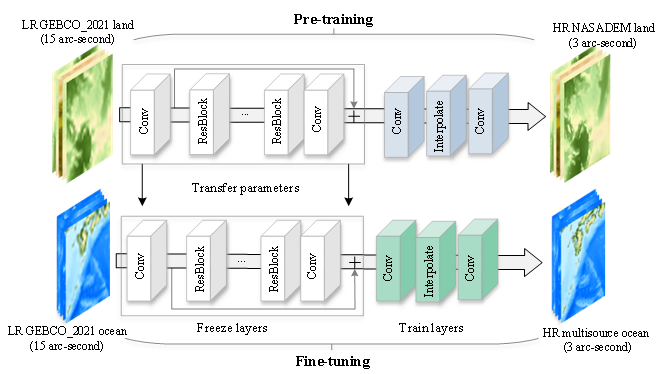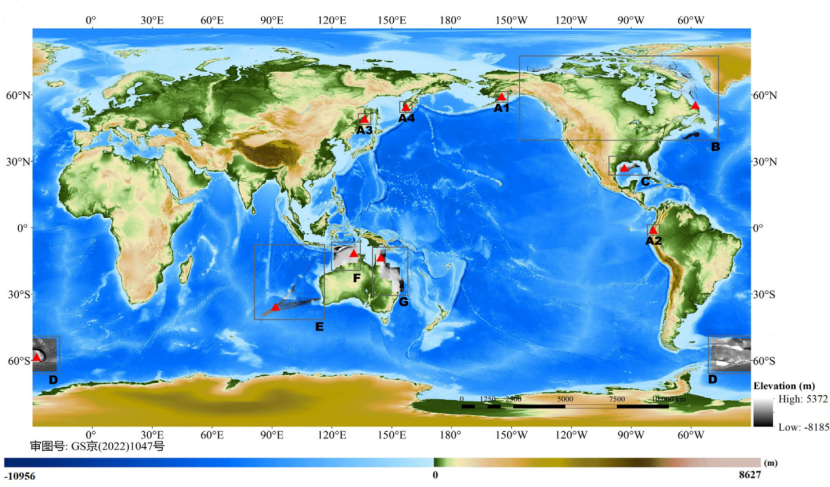High-resolution Digital Elevation Model (DEM), which can offer accurate basic geographical data, plays a vital role in the research fields of global climate change, ocean tidal movement and matter exchange of terrestrial spheres. High-resolution global ocean DEMs, as a frontier branch of marine geology and marine surveying and mapping, provides a direct basis for understanding the tectonic movement and evolution of the seabed. However, technical limitations and surveying and mapping costs have made it expensive to obtain high-resolution global ocean DEMs.
In December 2022, Professor Huang Xiaomeng’s Research Group of the Department of Earth System Science (DESS), Tsinghua University published an article titled “Super-resolution reconstruction of a 3 arc-second global DEM dataset” in Science Bulletin, releasing a 3 arc-second (90m) global land-sea DEM data product (GEBCO_2021).
Based on 30m resolution NASADEM satellite images, the 450 m resolution GEBCO_2021 public data of the United Nations Intergovernmental Oceanographic Commission and the high resolution ocean topographic data of some regions, a global DEM-SRNet model has been built and a global 3 arc-second (90 m) resolution land-sea DEM product GDEM_2022 has been developed in this study by adopting the technology combining a deep residual pre-training neural network and Transfer Learning.

Fig. 1. Overview of technical frameworok of the pre-training and fine-tuning global land-sea DEM dataset
Compared with the widely used methods based on interpolation or other deep learning, the results of the model are better than those of similar methods. An average improvement in RMSE of 23.75% can be found in the GDEM_2022 product over the bicubic (traditional) interpolation. When GDEM_2022 and GEBCO_2021 are compared, it is found that GDEM_2022 terrestrial areas have better visual and detail outputs. The deep learning super-resolution DEM proposed in this study can significantly reduce the number of sea areas or points that need to be measured, which is a good supplement to the fine mapping of the seabed and the construction of global high-resolution DEM topographic maps.

Fig. 2. The 3 arc-second (90m) global DEM dataset GDEM_2022
This achievement is the first global land-sea DEM dataset with a resolution of less than 100 meters, able to meet the needs of ocean sounding data in different fields and at different levels, and providing important support for the research on the relationship between global land-sea gravity field and topography with different terrain complexity, exploration of the equilibrium mechanism of different land-sea tectonic units, and research on the influence of land-sea topography on ocean tidal current movement.
Zhang Bo, a postdoctoral fellow from the DESS, Tsinghua University, is the first author of the author, and Professor Huang Xiaomeng from the DESS, Tsinghua University is the corresponding author. Co-authors include Associate Professor Yu Le, Professor Zhang Qiang and Associate Professor Lu Hui from the DESS, Tsinghua University, Researcher Hong Danfeng from the Aerospace Information Research Institute, Chinese Academy of Sciences, Yu Kun and Wang Zidong from China Huawei Technologies Co., Ltd., Associate Researcher Wang Jie from Pengcheng Laboratory, Professor Li Xuelong from Northwestern Polytechnical University and Professor Gong Peng from the University of Hong Kong. This research is supported by National Key R&D Programs (2021YFC3101600, 2020YFA0607900, 2020YFA0608000), the National Natural Science Foundation (42125503, 42075137) and the national key science and technology infrastructure project Earth System Science Numerical Simulator Facility (EarthLab).
Full-text link:
https://www.sciencedirect.com/science/article/pii/S2095927322005412
Written by
Edited by Wang Jiayin
Reviewed by Zhang Qiang